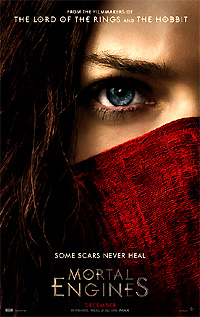
|
Bombs, Disasters and Film Flops: The Most Notable Examples 2018-2019 |
|
(chronologically, by film title) Intro | Summary Chart | Silents-1949 | 1950 -1966 | 1967-1969 | 1970-1974 | 1975-1977 | 1978-1979 1980 | 1981 | 1982 | 1983-1984 | 1985-1986 | 1987-1989 1990-1991 | 1992-1994 | 1995 - 1 | 1995 - 2 | 1996-1997 | 1998 | 1999 | 2000 | 2001 - 1 | 2001 - 2 2002 - 1 | 2002 - 2 | 2002 - 3 | 2003 | 2004 | 2005 | 2006 | 2007-2011 | 2012-2014 | 2015-2017 | 2018-2019 |
|
| Film Title, Director, Studio, Budget Information, Description | |

|
Mortal Engines (2018, NZ/US) The source of the American-New Zealand co-production was Scholastic's 2001-2006 Young Adult 4-part series titled Mortal Engines Quarter, a science-fiction fantasy about a ravaged, dystopian future running out of resources, with predator cities ("traction cities") roaming the countryside on wheels while searching for food and fuel. Each motorized mobile city lived on the principle of 'Municipal Darwinism' - survival of the fittest. The main reasons for its failure were numerous: its tired and derivative storyline - a cross between steampunk, Star Wars, and Mad Max (with a bit of The Lord of the Rings thrown in), there were no major stars, the direction was inept and simplistic, the screenplay was lackluster and illogical, the acting was weak and emotionless, and the source books were mostly unknown (unlike Twilight earlier). Although the film received very poor reviews and a tepid response, it was praised for its Visual Effects, production design, costumes, and musical score. The marketing effort by Universal for Christian Rivers' debut film was massive, estimated totaling over $120 million, but to no avail. Its main competitor when it debuted was Spider-Man: Into the Spider-Verse (2018), and the film quickly fizzled with the competition. It performed better overseas with $67.6 million, but it wasn't enough. Ultimately, the film became the biggest box-office bomb of 2018, and the biggest box-office bomb of all time, after taking into account all expenses and revenues. |

|
Robin Hood (2018) Who needed another resurrected recycling or retelling of the action-adventure Robin Hood legend, after years of remakes, reinvisionings and reimaginings, including Robin Hood: Prince of Thieves (1991), Robin Hood: Men in Tights (1993), and the very recent Robin Hood (2010) with Russell Crowe. The directorial film debut of Otto Bathurst (a TV director) revealed only its sloppiness and uninspiring, predictable action-oriented, choppy confusion. The lead character of the modernized story, Robin of Loxley (Taron Egerton) could not carry the proceedings, and the script was lazily written. In this predictable prequel, veteran Crusader Robin was trained by Little John (Jamie Foxx), leader of the Merry Men, to become Robin Hood, to eventually lead a rebellion against the corrupt Sheriff of Nottingham (Ben Mendelsohn). The very basic, wasted action film (with dark grimness) was released during the Thanksgiving Day holidays after being transferred first from an initial March opening, and then from a September face-off against Pacific Rim Uprising (2018). But then it faced popular and competitive films such as Ralph Breaks the Internet (2018) and Creed II (2018). Summit Entertainment's film grossed only $86.5 million - worldwide (on a budget of $100 million). Its domestic take was a paltry $31 million, and foreign returns were only slightly better at about $54 million. It was nominated for three Razzies for Worst Remake, Rip-Off or Sequel, Worst Supporting Actor (Jamie Foxx), and Worst Picture. |

|
A Wrinkle in Time (2018) Disney's sci-fi adventure film was notable for being the first live-action film with a million dollar budget to be directed by a non-white female (Ava DuVernay). DuVernay was also the first African-American woman to direct a film that earned at least $100 million domestically. The script was based upon the 1962 young adult novel of the same name, written by American author Madeleine L'Engle. An earlier adaptation included Disney's 2003 TV film of the same name directed by John Kent Harrison. The film's screenwriter Jennifer Lee had pitched Disney to adapt the 1962 classic book as a follow up project to Frozen (2013) that she had co-directed and written. The tale was set up to include positive messages about female empowerment, inclusivity and diversity - strong themes of the late 2010s. The tween-friendly film was a major box-office bomb, mostly due to its inflated production and marketing budget that was estimated to balloon up to $150 million. It was a close second to Mortal Engines (2018) that was the biggest flop of the year. It was a visually-stunning film with extensive CGI, but the plodding and overwrought script was too drawn out and ill-paced. The fantasy film's plot was a coming of age story about the epic journey of smart, bi-racial 13-year-old Meg Murry (Storm Reid), a misfit and outcast at school, to locate her missing, reknowned astrophysicist father Alex (Chris Pine), who had disappeared four years earlier. She was assisted through the universe to visit strange and distant planets and worlds by three supernatural beings wearing extravagant costumes: red-haired jokester Mrs. Whatsit (Reese Witherspoon), Mrs. Who (Mindy Kaling) who only spoke in quotations, and Mrs. Which (Oprah Winfrey) noted for one-liners. The group discovered that a malevolent, omnipotent otherworldly presence known as the It had captured her scientist father. |

|
Cats (2019) This strange, not-light-hearted musical fantasy film was based on Andrew Lloyd Webber's musical of the same name (it was the fourth-longest running show in Broadway history). It told about a tribe of anthropomorphic street alley cats known as the Jellicles - an unruly group living in the sinister underworld of a metropolitan area. The main catalyzing event was their yearly nocturnal ceremony, the Jellicle Ball, to elect one of them to achieve spiritual enlightenment. The chosen one, by wise matriarchal elder Old Deuteronomy (Judi Dench), would ascend to the Heaviside Layer ("Heaven") and be reborn in a reincarnated new life within the tribe. The over-produced story, trying to capitalize on the likes of stars Taylor Swift (as femme fatale moll Bombalurina), Jennifer Hudson (as banished Grizabella, performing the film's sole show-stopping song "Memory"), and Idris Elba (as the evil, scheming stray cat Macavity with the power of teleportation), was told from the point-of-view of abandoned, rejected and wide-eyed Victoria (a Royal Ballet dancer Francesca Hayward), who found herself in a strange tribe of cats as a small white kitten. The troubled, over-conceptualized film was lauded for its surreal and visual atmosphere, but severely criticized for its traumatic, aggressive and menacing tone, ghoulish and sexualized costumes, lack of character development, fast-cutting camera movements, unreal CGI effects ("digital fur"), loud soundtrack (with unintelligible lyrics), and overpowering nightmare-producing images for young children. Part of the reason for its financial downfall was exorbitant studio spending of about $115 million on global promotions and advertisements. It also faced the formidable release of Star Wars: The Rise of Skywalker (2019) at the same time. |

|
Dark Phoenix (2019) (aka
X-Men: Dark Phoenix) This obligatory summer blockbuster was the 12th entry in the X-Men series franchise, and a sequel to X-Men: Apocalypse (2016). It was considered to be the fourth and final film in the Marvel Comics' X-Men: First Class series, preceded by X-Men: First Class (2011), X-Men: Days of Future Past (2014) and X-Men: Apocalypse (2016). It was destined to be the last Fox-produced film featuring the X-Men - and future X-Men films (possibly with a different approach) would be produced by Marvel Studios as part of the Marvel Cinematic Universe. Part of the reason for its commercial and critical failure was the audience's disinterest and boredom with the entire franchise and its long-running character and plot arc. Other reasons included the unorganized marketing campaign for the film due to the merger between Fox and Disney at the time, its release-date pitting it against The Secret Life of Pets 2 (2019), and its numbing expository dialogue. Writer/director Simon Kinberg's anti-climactic superhero saga (his directorial debut film) was about the continuing story of Jean Gray (Sophie Turner), originally in a backstory an orphaned girl with telekinetic psychic powers. During an ill-fated and disastrous trip into space to save the crew of a stranded, out-of-control shuttle the Endeavor, she survived but was infected and transformed by the blast of a solar flare into a deadly power known as the Dark Phoenix - a supernatural planet-destroying force. She was abetted by Vuk (Jessica Chastain), the leader of a dying, shape-shifting alien race (known as the D'Bari), who was searching for the power residing within Jean, to use it to conquer Earth. Other returning characters reunited in this heartless sequel included Mystique/Raven (Jennifer Lawrence), Magneto/Erik Lehnsherr (Michael Fassbender), and Professor Charles Xavier (James McAvoy), among others. Although the special effects were often extraordinary, the CGI was quite under-whelming. It was a major bomb that grossed only $65.8 million (domestic) and $252.4 million worldwide (its exorbitant production budget was $200 million), and it became the lowest-grossing installment in the series to date. |

|
Terminator Dark Fate (2019) This was the most recent (6th) entry in the Terminator series franchise, with an exorbitant budget of $185 million, plus an expensive marketing campaign of about $80-100 million. It performed well below expectations, with some complaining it was a dull and uninteresting rehash of a tired franchise with rearranged time-travel (and character manipulation). Losses were ultimately expected to be over $100 million. In order to tell its recycled, female-oriented story, it had to ignore the events of the third, fourth, and fifth films in the franchise, in order to emphasize its returning older characters - Sarah Connor (62 year-old Linda Hamilton) and the original Terminator himself (Arnold Schwarzenegger). It was considered the third and final film of the original trilogy, and if successful, might become the first film in a new Terminator trilogy. In the film's startling, plot-twisting opening set in the year 1998, Sarah Connor's teenaged son John (CGI Edward Furlong and Jude Collie) was murdered on a Guatemalan beach by a T-800 Terminator (Schwarzenegger). Then, moving ahead two decades after the first two movies, in the year 2020 in Mexico, aging Sarah Connor reappeared to protect scared young female Resistance soldier Daniella "Dani " Ramos (Natalia Reyes), who was being targeted by a new advanced prototype Terminator from the dystopian future. The new nemesis was known as a Rev-9 model (Gabriel Luna), that could separate his cybernetic endo-skeleton from his shape-shifting (liquid metal) exterior and be in two places at once. A cybernetically-enhanced Resistance super-soldier Grace (Mackenzie Davis), who had followed the Rev-9 through time from the year 2042 to stop him, also joined Sarah and Dani. The newest AI enemy, the successor to Skynet, was known as Legion, controlling a global network of computer servers intent on destroying humanity. (Grace was designated as the successor to lead the Resistance against the machines, to take over the mantle of Sarah's deceased son John Connor.) When hope was dwindling, the three women relied upon help from retired, T-800 Terminator (Schwarzenegger), known as "Carl," living a normal human life in Laredo, Texas. |